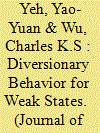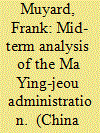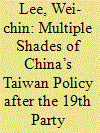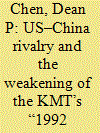| Srl | Item |
| 1 |
ID:
146955


|
|
|
| 2 |
ID:
173981


|
|
|
|
|
| Summary/Abstract |
This paper explores the mechanisms and circumstances under which leaders in weak states adopt diversionary behavior to deal with domestic problems. We examine the case of Taiwan to see if its President, Tsai Ingwen, has adopted diversionary behavior from 2016 to the present. We found that, unlike great powers, weak-state leaders often resort to non-force tactics such as blaming foreign opponents, but the emergence of diversionary behavior is conditional on the stability of their relationship with a major power. In the case of Taiwan, Tsai adopted a more confrontational foreign policy toward China only when USA–Taiwan relations had become more stable and more favorable toward Taiwan. Future work could continue to explore the circumstances and tools unique to weak states’ diversionary behavior.
|
|
|
|
|
|
|
|
|
|
|
|
|
|
|
|
| 3 |
ID:
182494


|
|
|
|
|
| Summary/Abstract |
Tsai Ing-wen was elected as the first woman president of Taiwan in 2016 and re-elected in 2020. Did the prospect of “the first woman president” shape the expectations of the changes she may bring about regarding women and lesbian, gay, bisexual, trans, and queer (LGBTQ) rights? Analyzing 35 in-depth elite interviews, this paper demonstrates Tsai’s campaign did not benefit much from “the first woman” slogan, her cabinet included fewer women than her predecessors’, and she could not proactively push for marriage equality after the elections. Tsai’s case illuminates the constraints women leaders face in promoting representation for marginalized groups.
|
|
|
|
|
|
|
|
|
|
|
|
|
|
|
|
| 4 |
ID:
100649


|
|
|
| 5 |
ID:
173980


|
|
|
|
|
| Summary/Abstract |
The study begins with descriptions of the changing political landscape of Taiwan’s domestic politics and China’s increasingly influential role in global politics to show the strategic terrain of asymmetric relations between the People’s Republic of China and Taiwan (cross-Strait relations) and some lessons of Taiwan’s 2016 elections. It attempts to delineate the 19th Party Congress report for meaningful contemplation of and conjecture about China’s purposes and policies in dealing with the prickly Taiwan issue. In essence, China’s policy under Xi Jinping after the 19th Party Congress has been characterized by a dualist approach in which a soft power charm offensive has been the primary strategy to appeal to the Taiwanese public, whereas coercive measures in the diplomatic arena and military sphere have served as the supplementary approach to pressure the Democratic Progressive Party government.
|
|
|
|
|
|
|
|
|
|
|
|
|
|
|
|
| 6 |
ID:
172463


|
|
|
|
|
| Summary/Abstract |
Externally, Taiwan in 2019 was strongly influenced by China’s campaign for unification and the collateral impacts of the trade war between the US and China. The external factors further intertwined with domestic party politics ahead of the 2020 presidential and legislative elections.
|
|
|
|
|
|
|
|
|
|
|
|
|
|
|
|
| 7 |
ID:
148091


|
|
|
|
|
| Summary/Abstract |
As President Tsai Ing-wen assumes power, she faces a citizenry hoping that she can revitalize Taiwan's economy, including: promoting high growth, low unemployment, equitable distribution of income, affordable housing for working people, food safety and quality of life in a democratic country. They also expect that she will not be deterred from engaging in the international arena. However, President Tsai faces several challenges amid slowing growth in much of the world, and Taiwan's partial exclusion from the international economic order will affect prospects for her success in meeting expectations for further economic progress.
|
|
|
|
|
|
|
|
|
|
|
|
|
|
|
|
| 8 |
ID:
160457


|
|
|
|
|
| Summary/Abstract |
The Tsai Ing-wen administration of Taiwan has taken a different approach in various defense policies compared to its predecessor. Several military build-up projects are aimed at strengthening Taiwan’s defense in the context of China’s rising military power, but they are unlikely to significantly ameliorate the island’s inferior military status, due to several vulnerabilities.
|
|
|
|
|
|
|
|
|
|
|
|
|
|
|
|
| 9 |
ID:
146905


|
|
|
|
|
| Summary/Abstract |
The PRC’s increasingly assertive foreign policy behaviors have triggered heightened anxiety among its regional neighbors. Washington has abided by a long-standing strategic ambiguity policy to manage the Taiwan Strait impasse. However, as the KMT’s “1992 consensus” policy places Taiwan in close union with Beijing, Taipei’s security positions sometimes go against the interests of the US and its allies in the Asia-Pacific. Pulling Taiwan away from China’s orbit is congruent with US interest in continuing that enduring policy framework and ensuring a healthy balance across the Strait.
|
|
|
|
|
|
|
|
|
|
|
|
|
|
|
|